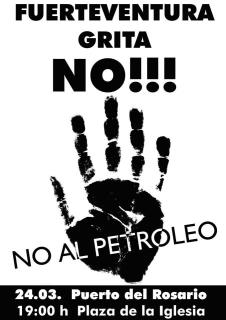Repsol the oil drilling giant has set its sights on the Canary Islands as its next project or victim as the case may be. Controversial decision making and environmental endangerment are the topics of intense conversation as the islands’ future is being mapped with no regard for public opinion.
Repsol announced on Friday 16th March 2012 that oil prospects will go ahead in the Canary Islands as it is the “biggest discovery of hydrocarbon in Spanish history”. Oil exploration will take place between Fuerteventura and Lanzarote in a bid to kick start the islands’ and subsequently, Spain’s flagging economy. The vast majority are not as enthused by recent developments as Paulino Rivero, President of the Canarian Government concurs in a statement, “The archipelago would use all legal means at its disposal to stop the oil exploration from taking place.”
Despite Repsol’s guarantee to carry out exhaustive environmental studies before drilling commences, many are not convinced the study will consider all necessary aspects. In 2014, they expect to begin exploration to confirm the area’s potential and if the results are positive, Repsol will determine the boundaries where drilling can take place. The final decision is due in 2016 with first extractions in 2019 or thereabouts.
WWF has criticized the project as they mobilize in an effort to prevent this environmental catastrophefrom ever happening. The Canary Islands are a well known and much loved holiday spot for more than 9 million visitors per year and some islands are classified as a Biosphere Reserve for their wealth in sea-life and unique biodiversity. The prospect of oil rigs being erected a mere 60kms off the shore is devastating to say the least. Beatriz Ayada of WWF Spain stated, “The area in which Repsol, the multinational oil giant plans on carrying out oil exploration is being studied in an attempt to classify it as a Site of Community Importance as per the LIFE + INDEMARES project.” At the same time Repsol is studying potential drilling sites, environmental associations are organizing counter studies to back up claims that oil exploration in this region will have a devastating impact on marine life.
Unfortunately, this is not the first time the subject of drilling for oil has come up. Back in 2001, the Central Government allowed Repsol to study Canarian waters as a viable location but the Supreme Court revoked said authorization in 2004 amid claims of “deficient environmental controls”, which resulted in the project being annulled on what has been termed a “technicality”. Now it has reared its ugly head once more but there may not be any stopping it this time around.

Tragic images from the BP Gulf of Mexico Oil Spill, 2010
Since the project has been reopened, the Canarian Government, the Canarian Parliament and Regional Authorities on both Fuerteventura and Lanzarote have not held back in displaying their complete rejection of the move.
“The central government treats us as if we are a colony lost in the Atlantic. This decision serves just one purpose: to benefit a private company,” added Rivero who belongs to the Coalicion Canaria, a Canarian nationalist party which pushes for greater autonomy for the islands.
Greenpeace said it will stage protests against the oil exploration in various cities in the archipelago on March 24 and the local population has had no qualms in voicing its concern for what the future holds.
Greenpeace said the decision to allow oil exploration off the Canary Islands was “irresponsible” because it exposes the citizens and environment of the region to serious risk. Deep-water operations are inherently dangerous and pose enormous risks of spills, fires and pollution as demonstrated by the collapse of the BP platform in the Gulf of Mexico less than two years ago,” the group added in a statement.
Spain imports more than 99% of its oil so this move is said to help slow price increases, the threat of another recession and record highs in unemployment, not to mention the ever growing national debt. Debt to include regional and local debt amounted to more than 735 billion euros according to figures recorded at the end of 2011. What we have to ask ourselves at this point is, how will this benefit the Canary Islands where petrol prices are concerned? Any petrol obtained from oil drilling will surely be exported which means that petrol prices will not be affected whatsoever.
The risks are incalculable. Even if the islands never suffer the damage of an oil spill, the refinery itself is damaging enough to the marine eco-system. Repsol insists that sufficient security measures will be put into action and assure that in 2008, “new regulations were approved which included the obligation to determine the sensitivity of areas influenced by our operations and to evaluate on a project-by-project basis whether or not to proceed in cases of sensitive areas.” If Lanzarote and Fuerteventura are designated Biosphere Reserves, does that not go to show the sensitivity of the area before exploration even commences? Is the prospect of mining 100.000 barrels of oil per day just too much for that important factor to be taken into consideration? The Canary Islands have more than enough natural resources in the form of wind and solar power on their side to promote renewable energies as a viable alternative so why are they being ignored in favour of harmful oil refineries?
Instead of answering these questions head-on, Repsol prefers to theorize, saying that the islands are in more danger from drilling due to begin in Moroccan waters due to the south-flowing current than from the rig they hope to erect in close proximity to the Canaries which isn’t a reassuring prospect either. Basically, our tranquil, rich waters are being plagued by greedy companies who don’t care about the dangers they impose or the risk of polluting our sea with a thick oil slick no matter how slim the chances are (according to their estimations). In this particular case, the greedy corporations have a name: Repsol YPF, S.A. (50%), Australia’s Woodside Petroleum Ltd (30%) and Germany’s RWE AG (20%).
Lois Epstein of the Wilderness Society in Anchorage spoke of a recent oil spill in Alaska, “What this shows, and this is not the first time, is that drilling is a dirty and complicated business and that accidents happen, even to the best of companies, even with the best of oversight. What that tells me as someone who is working to find the right balance between drilling and protection is that you’ve got to recognize that certain areas, if you’re going to allow drilling, there are going to be problems, and therefore the most sensitive areas need to be protected from drilling.”
Repsol has been the cause of numerous oil spills, for example, in 2008, the company was responsible for 100 barrels of crude oil spilling into the Ecuadorian Amazon Yasuni National Park. Back in 2005 there were 1321 oil spills that totalled 1829 tonnes of hydrocarbon leaking out and affecting soil. What is to stop disasters like these from happening here? Even though adding an industry as profitable as the oil industry to the Canary Islands repertoire would no doubt be beneficial especially during these times of economic crisis, there are many aspects to consider and do the positives outweigh the negatives? We have to remember that the waters in which oil exploration will occur is not only for bathing, it is also our drinking water our most valuable asset…

How will this decision affect future generations?


